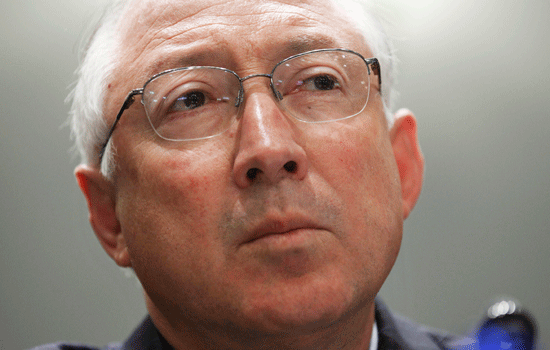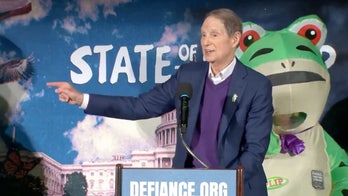
Interior Secretary Ken Salazar testifies on Capitol Hill in Washington, Wednesday, May 26, 2010, before the House Natural Resources Committee hearing on the "Outer Continental Shelf Oil and Gas Strategy and Implications of the Deepwater Horizon Rig Explosion." (AP)
As members of the agency that oversees offshore drilling confront a potential criminal prosecution for a variety of offenses ranging from lax enforcement to watching porn and coming to work high, the administration official charged with its oversight faced a barrage of criticism on Capitol Hill Wednesday.
Interior Secretary Ken Salazar told the House Natural Resources Committee Wednesday that BP has taken responsibility for cleaning up the millions of gallons of oil flowing into the Gulf of Mexico, endangering wildlife and the livelihood of generations of fishermen.
But Rep. George Miller, D-Calif., told Salazar that's not good enough -- the Minerals Management Service, which is in charge of permitting oil companies, has gone to "hell in a hand basket and we need to know what we're dealing with."
"These assurances aren't worth spit," he said of BP's pledges to clean-up the Gulf.
Miller recalled that back in the 1980s, Exxon said it could clean up 30 percent of the Valdez tanker spill in Alaska within 48 hours.
"They didn't clean up 1 percent of the oil," he said.
"So that's why I'm being harsh here, because we have to know the integrity of this agency," Miller said, noting he was chairman of the House committee in charge of MMS oversight at the time of the Valdez spill. "The regulatory regimes that they provide are of the protection, as we now see, of vast geographical areas of our nation."
Members of Congress and President Obama have criticized what they call the cozy relationship between regulators and oil companies and have vowed to reform MMS, which both regulates the industry and collects billions in royalties from it.
The agency is under fire for allowing oil drilling in the Gulf of Mexico without requiring oil companies to provide necessary permits from the National Oceanic and Atmospheric Administration.
And a new Interior Department report has found that staffers at MMS accepted tickets to sports events, lunches and other gifts from oil and gas companies and used government computers to view pornography.
Salazar said Wednesday there's "no doubt that there does need to be reform of this agency."
"We have made major reforms, including the elimination of the royalty-in-kind program, the ethics standards that we have put in place, the ethics personnel," he said, adding that the department has also appealed to Congress for "organic" legislation.
Salazar last week proposed eliminating the MMS and replacing it with two bureaus and a revenue collections office. The name Minerals Management Service would no longer exist.
The report Tuesday by the department's acting inspector general found that staffers in the Louisiana office of the MMS violated a number of federal regulations and agency ethics rules. The report follows up on a 2007 investigation that revealed what then-Inspector General Earl Devaney called a "culture of ethical failure" and conflicts of interest at the minerals agency.
Salazar called the latest report "deeply disturbing" and said it highlights the need for reforms he has proposed, including a plan to abolish the minerals agency and replace it with three new entities.
The report covers actions well before last month's disastrous oil spill in the Gulf of Mexico, but it adds to the climate of frustration and criticism facing the Obama administration in the oil spill disaster.
Salazar said several employees cited in the report have resigned, were fired, or referred for prosecution. More may be fired, disciplined or referred for criminal prosecution as warranted, Salazar said.
The examples in the report by Mary Kendall, the Interior Department's acting inspector general, applied to activities between 2000 and 2008. The secretary said he has asked Kendall to expand her investigation to look into agency actions since he took office in January 2009.
The Associated Press contributed to this report.












































